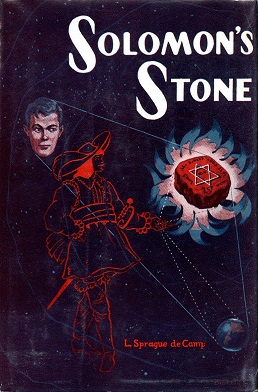 |
Solomon's Stone (1957) by L. Sprague de Camp, cover art by Ric Binkley |
Last month Theodric of Mythopoeic Rambling noted that the dedication of Dr. Holmes' novel The Maze of Peril is to three people for literary inspiration: Tolkien, Lovecraft and L. Sprague de Camp. Theodric wrote: "I can't say much of anything about his naming L. Sprague de Camp, as I believe I have only read his S&S anthology and his Compleat Enchanter. Others may have more to offer here, although, an obvious connection to be made is that both men were avid fans of Howard and Lovecraft. Perhaps there is something about de Camp's attempts to combine the zany and the scholarly in his work that attracted Dr. Holmes? Further, they have in common the effort to keep dead authors' universes alive by penning new (or finishing incomplete) works set within them."
I commented that I'd write something about de Camp and Holmes when I got a chance. So, to finally elaborate, Holmes refers to de Camp's work several times in his 1981 book, Fantasy Role-Playing Games (which predates The Maze of Peril by about five years). First, in chapter 3, Holmes includes de Camp in a discussion of "literary inspiration for the worlds of fantasy role playing games": "most fantasy games are closer to the wild, blood-thirsty worlds of Fritz Leiber, Robert E. Howard and L. Sprague de Camp [than Tolkien] ... De Camp's The Compleat Enchanter discusses magic as a separate kind of reality with its own rules of logic" (page 46).
However, later in the book (chapter 13), Holmes discusses another de Camp story more extensively:
The Maze of Peril is fiction that is highly derivative of D&D - as acknowledged by Holmes. The first dedication is to "Gary Gygax, who invented the game" and the second is to his sons and friends who created the characters while playing D&D. Based on the statements in his FRPG book, and because it is to de Camp alone rather than Pratt, I think that the dedication to de Camp for literary inspiration derives from his appreciation for Solomon's Stone.
I've read the first three books of the Compleat Enchanter series (and will eventually read the rest) and would like to read Solomon's Stone but it remains out of print and used copies are prohibitively expensive.
I followed this with a few posts on other connections between de Camp & Holmes/Basic:
Conan on the River of Doom
Holmes and de Camp in Dragon Magazine
de Camp's Great Stone Skull
Nice find, Zach!
ReplyDeleteAllan.
Many thanks, Z. Once again, I'm reminded that I've *got* to get hold of a copy of Fantasy Role-Playing Games (1981). I have begun agitating for your post and for attention to Solomon's Stone.
ReplyDeleteCharles Williams (one of the Inklings) wrote a story called "Many Dimensions" which revolves around Solomon's stone. I'm curious to learn how de Camp's story compares.
ReplyDelete